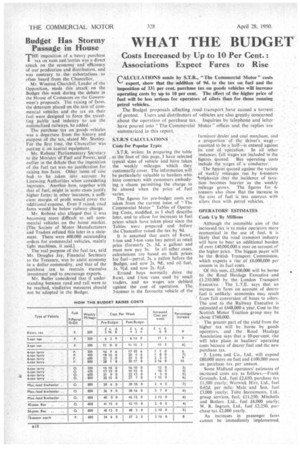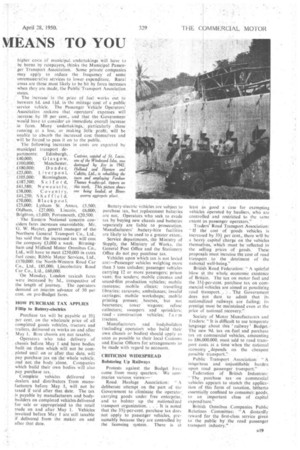WHAT THE BUDGET
Page 52

Page 53

If you've noticed an error in this article please click here to report it so we can fix it.
NIE-ANS TO YOU
Costs Increased by Up to 10 Per Cent. : Associations Expect Fares to Rise
CALCULATIONS made by S,T.R., "The Commercial Motor" costs expert, show that the addition of 9d, to the tax on fuel and the imposition of 33A per cent, purchase tax on goods vehicles will increase operating costs by up to 10 per cent. The effect of the higher pike of fuel will be less serious for operators of oilers than for those running petrol vehicles The Budget proposals affecting road transport have caused a torrent of protest. Users and distributors of vehicles are also greatly concerned about the operation of purchase tax.. Inquiries by telephone and letter have poured into "The Commercial Motor" offices and the replies are summarized in this report.
S.T.R.'S CALCULATIONS COSIY3 for Popular Types .S.T.R. writes: In preparing the table at the foot of this page. I have selected typical sizes of vehicle and have taken the weekly mileages which they customarily cover. The information, will, be particularly valuable to hauliers who have contracts with customers embodying a clause permitting the charge to be altered when the price of fuel
varies. • • The figures for pre-budget costs are taken from the current issue of "The Commercial Motor" Tables of Operating Costs, modified, as I shall describe later, and to allow for increases in fuel prices which have taken place since the Tables were prepared and ,before the Chancellor raised the tax by 9d.
It is assumed that users of 8-cwt., 1-ton and 3-ton vans buy petrol at retail price (formerly 2s. 3d. a gallon) and must now pay ls. In all other, cases, calculations arc based on bulk prices for fuel—petrol, 2s. a gallon before the Budget. and now 2s. 9d.. and oil fuel, Is. 9Id. and now 2s. 6td.
Errand boys normally drive the 8-cwt. and 1-ton vans used by small traders, and no wages are debited against the cost of operation. The, 3-tonner is the favourite vehicle of the
furniture dealer and coal merchant, and a proportion of the driver's wage— assumed to be a-half—is entered against its cost of operation. In all other instances full wages are included in thp
figures quoted. Bus operating costs include the wages of a conductor. The figures quoted against the variety of weekly mileages run by 6-tonners Entohasize that the incidence of taxation becomes heavier as the weekly mileage grows. The figures for 6tonners also show that the increase in the cost of fuel is less onerous with oilers than with petrol vehicles.
OPERATORS' ESTIMATES Costs Up By Millions
Although the ostensible aim of the increased tax is to make operators more economical in the use of fuel, it is likely that the road transport industry will have to bear an additional burden of over £40,000,000 a year on account of the higher price. The biggest payer will be the British Transport Commission. which expects a rise of £6,000,000 per annum in its fuel costs.
Of this sum, £2,500.000 will be borne by the Road Haulage Executive and £1.250,000 by the London Transport Executive. The L.T.E. says that an increase in fares on account of dearer fuel is unlikely: economies may result I from full conversion of buses to oilers. The cost to the Railway Executive is estimated at £448,000 a year. Cost to the Scottish Motor Traction group may be about £740,000.
The greater part of the yield from the higher tax will be borne by goods operators, and the Road Haulage Association says that a 10-per-cent, rise will take place in hauliers' operating . costs because of dearer fuel and the new purchase tax.
J. Lyons and Co., Ltd.. will expend £80,000 more on fuel and £l00,000 more on purchase tax per annum.
Some Midland operators' estimates of increased costs are as follows:—Frank Grounds, Ltd., fuel £2,650, purchase tax 11.500 yearly; Warwick Hire, Ltd., fuel 0.62d. per mile; Male and Son, fuel £3,000 yearly; Tube Investments, Ltd., group services. fuel. £11.250; Mitchells and Butlers, Ltd., fuel £6,000 yearly: W. R. Ingram, Ltd., fuel £2,250, purchase tax 12,000 yearly.
As increases in passenger fares cannot be immediately implemented, higher costs of municipal. undertakings will have to be borne by ratepayers, thinks the Municipal Passen ger Transport Association. Some private companies may apply to reduce the frequency of some unremunerative services to lower expenditure. Rural areas are those most likely to be hit by fares increases when they are made, the Public Transport Association states.
• The increase in the price of fuel works out to between ld. and lid. in the mileage cost of a public • service vehicle. The Passenger Vehicle Operators' Association reckons that operators' expenses will increase by 10 per cent., and that the Government would hase to consider an immediate overall increase in fares. Many underiakings,, particularly those running at a loss, or making little profit, wilt be unable to absorb the increased cost themselves and will be forced to pass it on to the public, The following increases in costs are expsocd by municipal transport de HOW PURCHASE TAX APPLIES Fillip to Battery-electries Purchase tax will be payable at 331 per cent, on the wholesale price of all completed goods vehicles,tractors and trailers, delivered ex works on and after May 1. Bare chassis are not taxable.
Operators who take delivery of chassis before May 1 and have bodies built on them which will not he completed until on or after that date, will pay purchase lax on the whole vehicle, and not, the body alone. Companies which build their own bodies will also pay purchase tax.
Complete vehicles delivered to dealers and distributors from manufacturers before May 1, will not be taxed if sold after that date. The tax is payable by manufacturers and bodybuilders on completed vehicles delivered for sale or appropriated to the retail trade on and after May 1. Vehicles invoiced before May 1 are still taxable if delivered from the maker on and after that date. Battery-eleciric vehicles are 'subject to purchase tax, but replacement batteries are not. Operators who seek to evade tax by buying new chassis and batteries separately are 'liable to prosecution, Manufacturers' ,battery-hire facilities are likely to be used to a greater extent.
Service departments, the Ministry of Supply, the Ministry of Works, the General Post Office and the Stationery Office do not pay purchase tax, Vehicles upon which tax is not levied are—Passenger vehicles weighing more than 3 tons ttnladen; passenger vehicles carrying 12 or more passengers; prison vans; fire tenders; mobile cinemas and sound-film production vehicles; mobile canteens; mobile clinics; travelling libraries; caravans; ambulances; invalid carriages; mobile workshops; mobile printing presses; hearses, but not hearsettes; tower wagons; refuse collectors; sweepers and sprinklers; road construction vehicles; farm tractors.
Mannfacturers and bodybuilders (including" operators who build their own chassis or bodies) should apply as soon as possible to their local Customs and Excise Officers for arrangements to be made with remit to accounts.
CRITICISM WIDESPREAD Bolstering Up Railwa:ys
Protests against the Budget have come from many quarters. We summarize various views:—
Road Haulage Association: A deliberate attempt on the part of the Government to eliminate the operator_ carrying goods under free enterprise, and to bolster tip the nationakzed transport organization. . It is noted that the 33t-per-cent. purchase tax doe, not apply to passenger vehicles, presumably because they are controlled by the licensing system. There is at least as good a case for exempting vehicles operated by hauliers, svho are controlled and restricted to the same extent as passenger operators." ' Traders' Road Transport Association:
If the cost of goods vehicles is increased by 33i per cent., there vo;11 be a heavy capital charge on the vehicles themselves, which must be reflected in the selling prices of goods. These proposals must increase the cost of road transport to the detriment of the national well-being."
British Road Federation: A spiteful blow t the whole economic existence of Britain. The tax on motor fuel and the 33i-per-cent. purchase tax on cornmerciarvehicles are aimed at penalizing road transport. , . The GoVernment does not dare to admit that its nationalized railways are failing; its prestige must be maintained even at the price of national recovery."
Society of Motor Manufacturers and Fraders: "It is difficult to use temperate language about this railway' Budget.'The new 9d. tax on ,fuel and purchase tax on commercial vehicles, amounting to £86,000,000, must add to road transport costs at a time when the national economy ,,depends on the cheapest possible transport."
Public Transport Association: "A iniquitous and unjustifiable burden upon road passenger transport."
Federation of British Industries: "'rhe purchase tax on commercial vehicles appears to stretch the applic-ation of this form of taxation, hitherto essentially confined to consumer :goods, to an important class of capital expenditure."
British Omnibus .Companies Public Relations Committee: "A dastardly reward for the first-class service given to the public by the road passenger transport industry."




































































































































































































